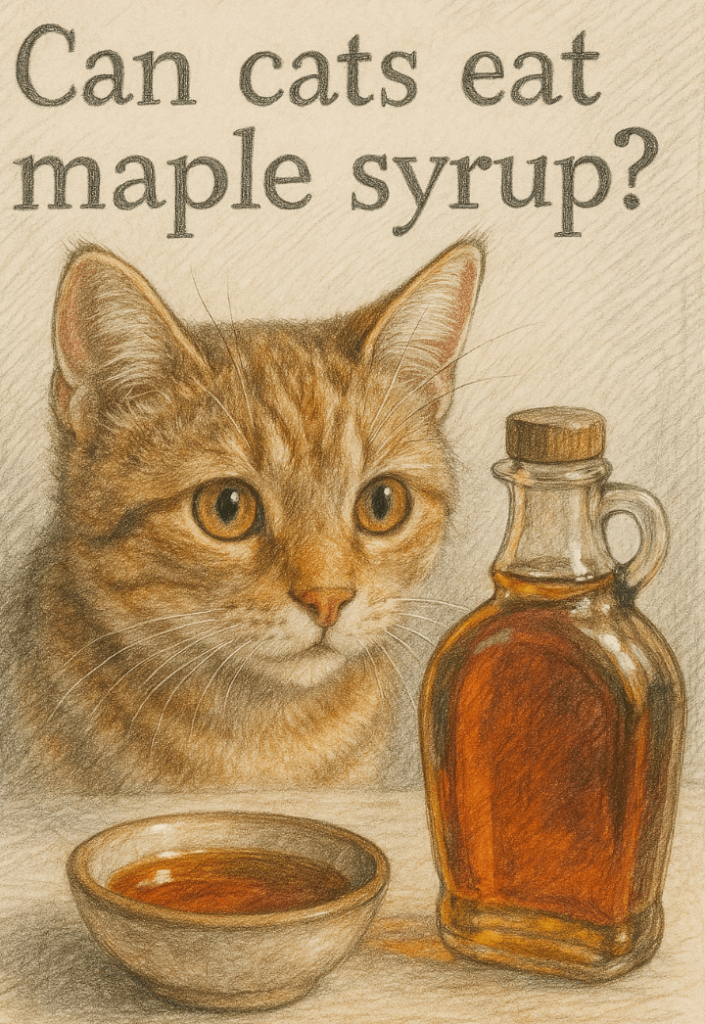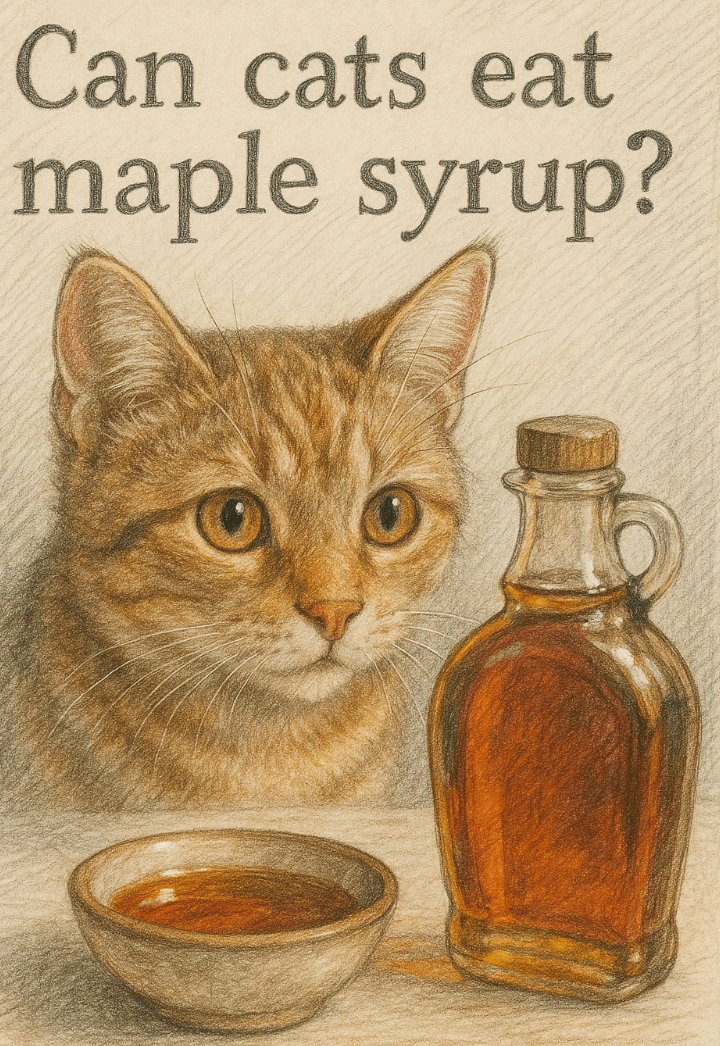Can Cats Eat Maple Syrup? Understanding the Risks and Benefits
As cat owners, we often wonder whether certain human foods are safe for our feline friends. One such question that frequently arises is, “Can cats eat maple syrup?” While this sweet treat might be a staple in your pantry, it’s essential to understand how it affects your cat’s health. Cats have unique dietary needs and sensitivities, and not all human foods are suitable for them. In this blog post, we’ll explore whether maple syrup is safe for cats, potential risks, and healthier alternatives to satisfy their curiosity about sweet flavors. Let’s dive into the details to ensure your furry companion stays happy and healthy.
Potential Risks of Feeding Maple Syrup to Cats
While maple syrup isn’t toxic to cats in small amounts, it poses several risks that pet owners should be aware of. Understanding these dangers can help you make informed decisions about your cat’s diet.
High Sugar Content:
Maple syrup is packed with sugar, which can lead to obesity, diabetes, and dental issues if consumed regularly by your cat.Digestive Upset:
Cats lack the enzymes needed to digest sugar properly, which can cause vomiting, diarrhea, or stomach discomfort after consuming maple syrup.Empty Calories:
Maple syrup offers no nutritional value for cats, making it an unnecessary addition to their diet that could replace healthier foods.Risk of Allergic Reactions:
Some cats may develop allergic reactions to unfamiliar ingredients, including maple syrup, leading to symptoms like itching or swelling.Artificial Additives:
Many commercial maple syrups contain additives like preservatives or artificial flavors, which can further irritate your cat’s digestive system.
These risks highlight why maple syrup should be avoided as a regular treat for your cat. Always prioritize their health over indulgence.
Signs Your Cat May Have Eaten Too Much Maple Syrup
If your cat accidentally consumes maple syrup or sneaks a taste when you’re not looking, watch for these warning signs that indicate they’ve had too much.
Lethargy or Fatigue:
Excessive sugar intake can cause a temporary spike in energy followed by a crash, leaving your cat unusually tired.Vomiting or Diarrhea:
Digestive upset is a common reaction to sugary foods, signaling that your cat’s body is struggling to process the syrup.Increased Thirst and Urination:
High sugar levels can lead to dehydration, prompting your cat to drink more water than usual.Weight Gain:
Regular consumption of sugary treats like maple syrup can contribute to unhealthy weight gain over time.Behavioral Changes:
Cats may become irritable or restless due to the effects of sugar on their system, deviating from their normal behavior.
Recognizing these signs early allows you to take action and prevent further complications.
Check this guide 👉Can Cats Eat Dandelions? Best 7 Expert Tips!
Check this guide 👉Can Cats Eat Quinoa? Best 7 Expert Tips!
Check this guide 👉Can Cats Eat Chicken Liver? Best 7 Expert Tips!

Safe Alternatives to Maple Syrup | Risks of Unsafe Treat Choices |
|---|---|
Plain cooked chicken (unsalted) | Sugary snacks like candy or syrup |
Fresh fruits like blueberries | Processed human foods high in fat |
Cat-safe dental chews | Foods containing artificial additives |
Homemade broth (no salt or sugar) | Dairy products like milk or cream |
Freeze-dried meat treats | Baked goods with refined sugars |
How to Safely Introduce Sweet Flavors to Your Cat
If your cat seems curious about sweet flavors, there are safer ways to satisfy their interest without resorting to sugary treats like maple syrup. Follow these guidelines to ensure their safety.
Offer Natural Options:
Provide small amounts of cat-safe fruits like watermelon or cantaloupe as a healthy alternative to processed sweets.Avoid Artificial Sweeteners:
Steer clear of sugar substitutes like xylitol, which are highly toxic to cats and can cause severe health issues.Stick to Moderation:
Even safe treats should be given sparingly to avoid disrupting your cat’s balanced diet.Monitor Their Reaction:
Observe your cat closely after introducing new foods to ensure they don’t experience adverse reactions.Consult Your Veterinarian:
Always seek professional advice before offering your cat any new type of food, including sweet treats.
By following these steps, you can indulge your cat’s curiosity safely and responsibly.
Benefits of a Balanced Diet for Cats
A balanced diet is crucial for maintaining your cat’s overall health and well-being. Here’s why focusing on nutrition is far more beneficial than offering sugary treats like maple syrup.
Supports Healthy Weight:
A proper diet helps prevent obesity, reducing the risk of related conditions like diabetes and joint problems.Promotes Strong Immunity:
Nutrient-rich foods strengthen your cat’s immune system, helping them fight off illnesses more effectively.Improves Coat and Skin Health:
Essential fatty acids found in high-quality cat food keep their coat shiny and skin hydrated.Enhances Energy Levels:
A balanced diet provides sustained energy, keeping your cat active and playful throughout the day.Prevents Digestive Issues:
Easily digestible ingredients reduce the likelihood of stomach upset and promote better nutrient absorption.
Prioritizing a balanced diet ensures your cat thrives both physically and mentally.
Common Mistakes to Avoid When Feeding Cats Human Food
Feeding cats human food requires careful consideration to avoid mistakes that could endanger their health. Here are some pitfalls to watch out for.
Assuming All Human Foods Are Safe:
Just because a food is non-toxic doesn’t mean it’s healthy or appropriate for cats.Overlooking Portion Sizes:
Even safe foods can harm your cat if given in excessive amounts, leading to weight gain or digestive issues.Ignoring Allergies or Sensitivities:
Some cats may react negatively to certain ingredients, so always introduce new foods gradually.Using Condiments or Seasonings:
Ingredients like salt, garlic, or onion powder can be harmful to cats and should never be added to their food.Neglecting Professional Advice:
Skipping a vet consultation can result in unknowingly harming your cat with inappropriate food choices.
Avoiding these mistakes ensures a safer and healthier experience for your cat.
Alternatives That Mimic the Sweetness of Maple Syrup
If you’re looking for ways to mimic the sweetness of maple syrup without the risks, here are some cat-friendly alternatives to consider.
Cat-Safe Fruits:
Small pieces of watermelon, cantaloupe, or blueberries provide natural sweetness without added sugars.Homemade Broth:
Unsweetened, low-sodium broths made from chicken or beef can satisfy cravings for flavorful treats.Freeze-Dried Meat Snacks:
These treats offer a savory yet satisfying option that aligns with your cat’s carnivorous nature.Plain Yogurt (Optional):
Some cats enjoy plain yogurt, which contains probiotics that support gut health—but only in moderation.Specialty Cat Treats:
Many brands offer treats specifically designed to appeal to cats’ taste preferences without compromising their health.
These alternatives allow you to cater to your cat’s curiosity while keeping them safe.
Understanding Your Cat’s Natural Instincts Around Food
Cats are naturally drawn to certain smells and tastes, including sweetness, due to their evolutionary history. Understanding their instincts helps explain their fascination.
Hunting Behavior:
Wild cats rely on protein-rich diets, so their interest in sweet flavors stems from curiosity rather than necessity.Exploration Through Taste:
Cats use their sense of taste to explore new textures and scents, making sweet foods intriguing to them.Craving Variety:
Domestic cats sometimes crave variety in their diet, leading them to investigate human foods like maple syrup.Social Bonding:
Sharing food is a way for humans to bond, and cats may associate tasting your food with affection and attention.Curiosity Over Nutrition:
Cats don’t instinctively seek out sweets for nourishment—they’re simply curious about novel experiences.
By recognizing these behaviors, you can better address your cat’s needs in a safe and controlled manner.
Frequently Asked Questions About Cats and Maple Syrup
Is maple syrup toxic to cats?
No, it’s not toxic, but its high sugar content makes it unhealthy and potentially harmful in large amounts.
What happens if my cat licks a tiny bit of maple syrup?
A small lick is unlikely to harm your cat, but monitor them for signs of digestive upset or unusual behavior.
Can kittens eat maple syrup?
Kittens are more sensitive to dietary changes, so it’s best to avoid giving them maple syrup altogether.
Are there any health benefits to feeding my cat maple syrup?
No, maple syrup offers no nutritional value for cats and should not be considered a health food.
What should I do if my cat eats a lot of maple syrup?
Contact your veterinarian immediately to assess the situation and prevent potential complications.
Prioritizing Your Cat’s Health Over Curiosity
While it might be tempting to share a drop of maple syrup with your curious feline friend, it’s important to remember that their dietary needs differ significantly from ours. Cats thrive on a balanced, species-appropriate diet free from unnecessary sugars and additives. By understanding the risks associated with sugary treats like maple syrup and opting for safer alternatives, you can ensure your cat stays healthy, happy, and full of energy. Always prioritize their well-being over momentary indulgence, and consult your veterinarian whenever you’re unsure about introducing new foods.
Do Cats Have Taste Buds? Best 7 Expert Tips! – Discover how cats experience flavors and why their taste is so unique.
Do Dogs Have Taste Buds? Best 7 Expert Tips! – Discover how dogs experience taste, their preferences, and what it means for their diet and health.
Can Cats Taste Sweet? Best 7 Expert Tips! – Discover why cats can’t taste sweetness, how it affects their diet, and tips to keep them healthy and happy.
Can Dogs Taste Sweet? Best 7 Expert Tips! – Discover how dogs perceive sweetness, which foods are safe, and tips to manage their sweet cravings responsibly.





